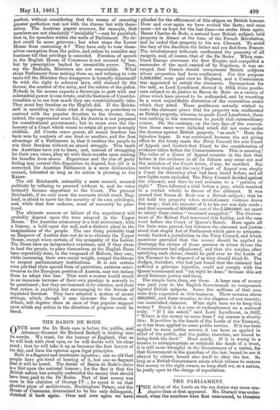THE BARON DE BODE O NCE more the De Bode case
is before the public, and Attorney-General Sir Richard Bethell is looking into its merits. We trust, for the honour of England, that as he will look with clear eyes, so he will decide with his clear mind ; that he will take it up as becomes the first lawyer of his day, and form his opinion upon legal principles. Here is a flagrant and inveterate injustice ; one so old that people have got tired of hearing of it, but one so flagrant that it will be heard. The denial of Baron de Bode's claim is a blot upon the national honour ; for the fact is that the British nation has actually embezzled the money that should have been paid to the De Bodes. Part of that money was once in the clutches of George IV. ; he spent it on that abortive piece of architecture, Buckingham Palace, and the House of Commons, determined to be the only delinquent, clutched it back again. Over and over again we have pleaded for the effacement of this stigma on British honour. Over and over again we have recited the facts ; and once more—let us hope for the last time—we recite them again. Baron Charles de Bode, a natural born British subject, held property in Alsace at the time of the French Revolution, and he ceded that property to his son Clement. To avoid the fury of the Jacobins the father and son fled from France. The revolutionary tribunals confiscated the property of all emigres, and, of course, that of the• De Bodes. When com- bined Europe overcame the first Empire, and compelled a surrender of the spoil carried off by Napoleon, it was ar- ranged that France should compensate British subjects whose properties had been confiscated. For this purpose 5,500,000/. were paid over to England, and a Commission was appointed to satisfy the claimants. Incompetent for the task, as Lord Lyndhurst showed in ] 852, these gentle- men refused to do justice to Baron do Bode on a variety of pleas which have proved to be unfounded, and by resorting to a most unjustifiable distortion of the convention under which they acted. These gentlemen actually wished to make the claimant prove that his property was confiscated as British property, whereas, to quote Lord Lyndhurst, there was nothing in the convention to justify that extraordinary course. On the contrary, on the very face of the conven- tion those cases were included which did not come under the decrees against British property "as such." Here the injustice began. It was continued, because the act giving effect to the treaty made the Privy Council the sole Court of Appeal, and limited that Court to the consideration of evidence taken before the Commissioners. This is amazing ! The value of a Court of Appeal consists in the fact that before it the evidence in all its fulness may come out and the mistakes of the Court below, if any, be rectified. But under this stupid act the very Court of Appeal was simply a Court for rehearing what had been heard before, and all new lights were excluded. The Privy Council decided against the claimant, and then lie had recourse to a " petition of right." Then followed a trial before a jury, which resulted in a verdict wholly in favour of the claimant. It was proved that Baron de Bode was a British subject ; that he did hold the property when revolutionary violence drove him away; that the transfer of it to his son was duly made ; and that upwards of 400,000/. out of the 5,500,000/. set apart to satisfy these claims " remained unapplied." The Govern- ment of Sir Robert Peel traversed this finding, and the case went before the Court of Queen's Bench. Here again all the facts were proved, but between the claimant and justice • stood that stupid Act of Parliament which gave so preposte- rously limited ajurisdiction to the Privy Council, and which moreover provided that the money should be applied to discharge the claims of those persons in whose favour the Commissioners had adjudicated, and that the surplus, after satisfying such claims, should be paid over to the Lords of the Treasury to be disposed of as they should think fit. The Judges, therefore, who had just found that the claimant had suffered a grievous injustice, could not comply with the Queen's command and "let right be done," because this act stood between justice and them. The simple facts, then, are these. A large sum of money was paid over to the English Government to compensate injured British subjects. Some five millions of that sum were duly expended in this business. There remains above 400,000/., and there remains, to the disgrace of our country, one unsatisfied claimant. What right have we to keep this money ? Surely it is a case of embezzlement on a national scale. " If I am asked," said Lord Lyndhurst, in 1852, " Where is the money to come from ? my answer is shortly this: It is either in the hands of the Lords of the Treasury, or it has been applied to some public service. If it has been applied to some public service, it has been so applied in relief of the public, and the public, therefore, are bound to bring forth the fund." Most surely. If it is wrong in a trustee to misappropriate or withhold the funds of a trust, it is still more wrongful in the Government of a nation, for that Government is the guardian of the law, bound to see it obeyed by others, bound also itself to obey the law. So long as a British Government exists which refuses to restore this money to the right owner, so long shall we, as a nation, be justly open to the charge of repudiation.






























 Previous page
Previous page